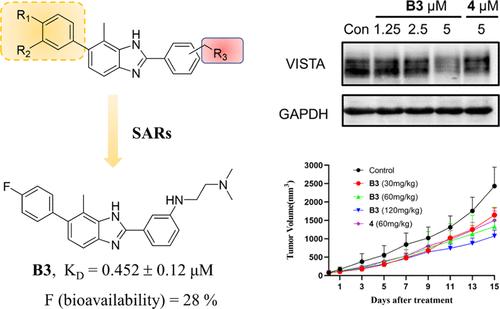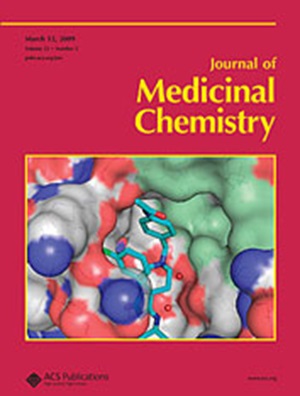Discovery, Synthesis, and Activity Evaluation of Novel Small-Molecule Inhibitors Targeting VISTA for Cancer Immunotherapy
IF 6.8
1区 医学
Q1 CHEMISTRY, MEDICINAL
引用次数: 0
Abstract
Immune checkpoint inhibitors (ICIs) have been potent therapeutic options for the treatment of multiple types of cancer. However, not all patients experience benefits from ICIs, and discovering inhibitors targeting novel immune checkpoints is necessary. V-domain Ig suppressor of T-cell activation (VISTA) is a novel immune checkpoint. Blockade of the VISTA pathway enhances antitumor immunity in multiple tumor types. Herein, a series of VISTA inhibitors based on the benzimidazole scaffold were discovered. B3 showed the strongest binding affinity to the VISTA protein with a KD value of 0.452 ± 0.12 μM. In vitro, B3 could effectively activate VISTA-mediated immunosuppression and induce effective VISTA degradation in HepG2 cells. In vivo, B3 improved pharmacokinetics compared to the lead compound 4. Moreover, compound B3 significantly inhibited tumor growth in a CT26 colon cancer model. These results suggest that compound B3 is a promising VISTA small molecule inhibitor and degrader worthy of further development as an antitumor agent.

求助全文
约1分钟内获得全文
求助全文
来源期刊

Journal of Medicinal Chemistry
医学-医药化学
CiteScore
4.00
自引率
11.00%
发文量
804
审稿时长
1.9 months
期刊介绍:
The Journal of Medicinal Chemistry is a prestigious biweekly peer-reviewed publication that focuses on the multifaceted field of medicinal chemistry. Since its inception in 1959 as the Journal of Medicinal and Pharmaceutical Chemistry, it has evolved to become a cornerstone in the dissemination of research findings related to the design, synthesis, and development of therapeutic agents.
The Journal of Medicinal Chemistry is recognized for its significant impact in the scientific community, as evidenced by its 2022 impact factor of 7.3. This metric reflects the journal's influence and the importance of its content in shaping the future of drug discovery and development. The journal serves as a vital resource for chemists, pharmacologists, and other researchers interested in the molecular mechanisms of drug action and the optimization of therapeutic compounds.
 求助内容:
求助内容: 应助结果提醒方式:
应助结果提醒方式:


